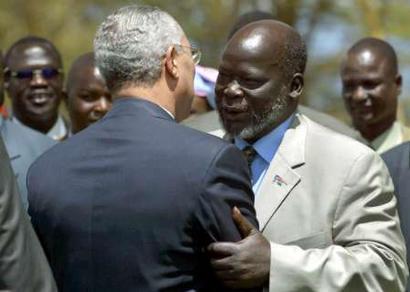Opposition fears peace will bring more repression to Sudan

By Mohamed Ali Saeed
KHARTOUM, Oct 22 (AFP) — The Sudanese opposition fears that the Islamist government and the southern rebel movement will forge a repressive alliance once they sign an agreement ending their 20-year civil war.
Reported plans by both to postpone elections until the end of a six-year interim period “implies the beginning of a fourth totalitarianism,” Umma Party Deputy President Omar Nour Ed-Daem told a rally ending overnight Tuesday.
The Islamist government of President Omar el-Beshir, the third Sudanese military leader to have seized power in the past four decades, and the rebel Sudan People’s Liberation Army (SPLA) have made huge strides at peace talks in Kenya.
But they have excluded other opposition groups from the negotiations which have already agreed on a six-year interim period of self-rule for the south, which is dominated by the SPLA, followed by a referendum on independence.
In the current round of talks, the government and the SPLA are focusing on the status of three central regions claimed by both sides and on how to share power and wealth, notably that of Sudan’s oil reserves.
During the rally at Khartoum University, Daem also read a statement on behalf of Umma leader Sadeq al-Mahdi calling upon the negotiators to propose national, rather than bilateral solutions to the country’s problems.
Mahdi complained the negotiations were proceeding without a mechanism to transform a peace agreement from a bilateral to a national one and without a role by north African neighbors Egypt and Libya.
He also criticized the negotiators as considering their negotiations as “a dual alliance,” according to his statement.
He urged the negotiators to “correct those mistakes.”
“The people of the Sudan are not waiting for a continued sharing of power on a rotating presidential basis but are demanding direct presidential, legislative and state elections,” the Mahdi statement said.
Opposition Democratic Unionist Party official Osman Omar al-Sherif reiterated his party’s support for peace, but said the Sudanese people will take over through multi-party elections” once peace is achieved.
Sherif slammed the National Islamic Front (NIF), which renamed itself the National Congress after taking power in Beshir’s June 1989 coup detat, saying the 14-year Islamic rule was “a dark era of oppression and injustice.
The gathering, witnessed by an AFP correspondent, was held on the University’s Eastern (sports) Ground, a traditional venue for such rare popular meetings.
“The leaders of the (government) should come to this Eastern Ground and cleanse themselves, in repentence, from the crimes they have committed against the people,” Sherif said.
The speakers included Ajok Makur, a southerner who introduced himself as a representative of SPLA leader John Garang and urged both Garang and Sudanese Vice President Ali Osman Taha to speed up concluding a peace agreement.
After meeting both Taha and Garang in Naivasha, US Secretary of State Colin Powell declared Wednesday that “Both sides have agreed to continue the talks and reach a comprehensive agreement no later than by the end of December.”
But a senior Sudanese officials said later it was “impossible to dictate” a deadline for reaching a deal.
Leaders of Communist, Nasserite Socialist, Baathist and other opposition parties also made speeches at the rally, which dispersed peacefully without any sign of police.
